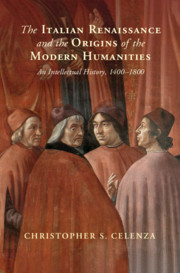Book contents
- The Italian Renaissance and the Origins of the Modern Humanities
- The Italian Renaissance and the Origins of the Modern Humanities
- Copyright page
- Dedication
- Contents
- Figures
- Preface and Acknowledgments
- 1 Philology, the Italian Renaissance, and Authorship
- 2 Lorenzo Valla, Philology, Emotion
- 3 Losing Your Identity: Angelo Decembrio
- 4 Trust and Authenticity
- 5 Pursuing a Love of Knowledge
- 6 Shaping Knowledge
- 7 Forgetting Philology: René Descartes
- 8 Certainty. Skepticism
- 9 Echoes
- Bibliography
- Index
6 - Shaping Knowledge
Published online by Cambridge University Press: 09 November 2021
- The Italian Renaissance and the Origins of the Modern Humanities
- The Italian Renaissance and the Origins of the Modern Humanities
- Copyright page
- Dedication
- Contents
- Figures
- Preface and Acknowledgments
- 1 Philology, the Italian Renaissance, and Authorship
- 2 Lorenzo Valla, Philology, Emotion
- 3 Losing Your Identity: Angelo Decembrio
- 4 Trust and Authenticity
- 5 Pursuing a Love of Knowledge
- 6 Shaping Knowledge
- 7 Forgetting Philology: René Descartes
- 8 Certainty. Skepticism
- 9 Echoes
- Bibliography
- Index
Summary
This chapter moves to the French Enlightenment, arguing that echoes of Renaissance humanism emerge in the Encyclopédie. This project, famous in the history of the book, was the brainchild of Diderot and D’Alembert, two luminaries who believed that a comprehensive account of all branches of human knowledge was needed. They financed the project themselves, through subscriptions, made expert use of illustrations, and created a monument in the history of the book. In their comprehensiveness, Diderot and D’Alembert were the heirs to Poliziano’s multidisciplinary drive. In their views of religion, they were the distant progeny of Valla. And in their antiinstitutional nature, they reflect Italian Renaissance humanism, a cultural movement whose protagonists often took care to situate themselves outside of existing institutions. After the treatment of the Encyclopédie, Thomas Jefferson makes a cameo appearance. In his “Jefferson Bible,” he literally cut and pasted parts of the New Testament that he believed showed Jesus’s true nature – not, in Jefferson’s view, as a divine personage (Jefferson discarded all the stories of miracles), but rather as an ethical exemplar. Doing so, Jefferson reflected one very important tendency in history of philology, one that Valla had begun, the Protestant Reformation spread, and the French Enlightenment completed: the desacralizing of the Bible
Keywords
- Type
- Chapter
- Information
- The Italian Renaissance and the Origins of the Modern HumanitiesAn Intellectual History, 1400–1800, pp. 128 - 157Publisher: Cambridge University PressPrint publication year: 2021

